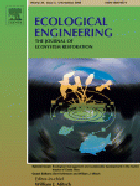|
Literature / Source Database:
Ecological Engineering
Description
the journal of ecotechnology
| Title (short) |
Ecol. Eng. |
| Languages |
English |
| First year |
1992 |
| Impact factor |
2.74 |
| Editor |
William J. Mitsch |
|
|

|
Status
active
Subject

Source type
Journal
Publisher
ISBN ISSN
0925-8574
First volume
1
Last volume
58+
Homepage
| Resources |
|
Availability |
|
|
|
|
|
| Text PDF |
 |
free access |
 |
| Text Html |
 |
for subscriber |
 |
| References |
 |
not available |
 |
| Abstracts |
 |
|
|
| TOC |
 |
|
|
|
|
|
|

Description
The journal is meant for ecologists who, because of their research interests or occupation, are involved in designing, monitoring, or constructing ecosystems. It is meant to serve as a bridge between ecologists and engineers, as ecotechnology is not wholly defined by either field. The journal will be read and contributed to by applied ecologists, environmental scientists and managers and regulators, natural resource specialists (e.g. foresters, fish and wildlife specialists), environmental and civil engineers, agroecologists, and landscape planners and designers. The journal is also for engineers who, as a result of training and/or experience in biological and/or ecological sciences, are involved in designing and building ecosystems. The journal is of particular interest to practising environmental managers due to its multidisciplinary approach to practical problems and opportunities.
Ecological engineering has been defined as the design of ecosystems for the mutual benefit of humans and nature. Specific topics covered in the journal include: ecotechnology; synthetic ecology; bioengineering; sustainable agroecology; habitat reconstruction; restoration ecology; ecosystem conservation; ecosystem rehabilitation; stream and river restoration; wetland restoration and construction; reclamation ecology; non-renewable resource conservation. Applications of ecological engineering (or ecotechnology) include wetland creation and restoration, pollution control by ecosystems, restoration and rehabilitation of forests, grasslands, lakes, reservoirs and rivers, and development of sustainable agroecosystems. Because ecological engineering is based on the premise of conserving both renewable and non-renewable resources by using both in partnership, the journal will also be pertinent to those involved in global change, alternative energy policies, ecological economics, environmental conservation, and global geopolitics.
Related links:
|